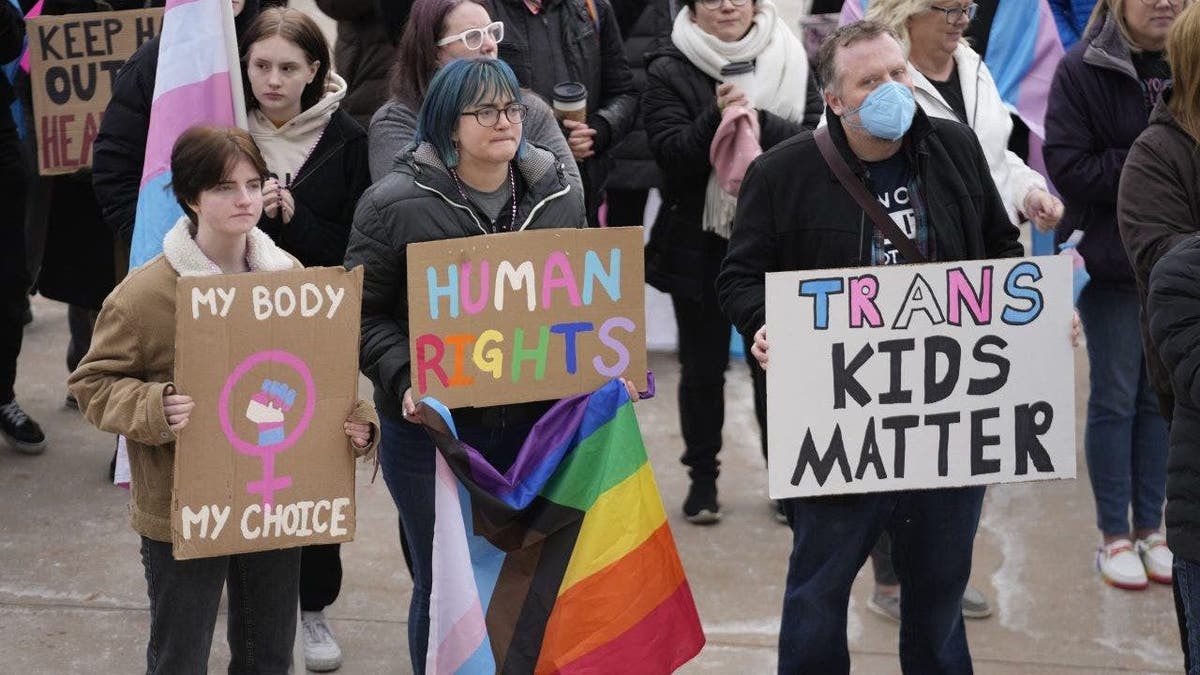The Ohio legislature has passed a bill that restricts transgender individuals from receiving gender-affirming care and participating in sports teams. The new law bans mental health counseling, other forms of gender-affirming care for trans minors, and bars transgender girls from female sports when it goes into effect in 90 days.
Ohio Legislature Passes Bill Restricting Transgender Care and Sports Participation
Ohio, United States United States of AmericaThe new law bans mental health counseling, other forms of gender-affirming care for trans minors, and bars transgender girls from female sports when it goes into effect in 90 days.
The Ohio legislature has passed a bill that restricts transgender individuals from receiving gender-affirming care and participating in sports teams.









Confidence
80%
Doubts
- It's unclear if this bill will be challenged in court.
- The law may not apply to all individuals who identify as transgender.
Sources
84%
Ohio bans gender-affirming care for minors, restricts transgender athletes over Gov. Mike DeWine's veto
CBS News Site: https://www.cbsnews.com/articles/about-us/ Thursday, 25 January 2024 04:19Unique Points
- The first week of January, Governor Mike DeWine signed an executive order banning gender-affirming surgeries for people under 18 despite medical professionals maintaining that such surgeries aren't happening in the state.
- Physicians have told ABC News that doctors, families and patients often have many long conversations together to consider age-appropriate individualized approaches to care. For youth approaching puberty, puberty blockers are a reversible form of gender-affirming care that allows children to pause puberty and explore their gender identity without the growth of permanent sex characteristics.
- At least 21 states have implemented restrictions on access to gender-affirming care, many of which have faced legal challenges. A law banning gender-affirming care for minors in Arkansas was ruled unconstitutional by a federal judge and similar laws were blocked in Georgia, Indiana, Idaho, Texas and Montana while lawsuits are considered.
- The new legislation will ban mental health counseling and other gender-affirming care for trans minors and bars transgender girls from female sports when it goes into effect in 90 days.
Accuracy
- At least 22 states have now enacted laws restricting or banning gender-affirming medical care for transgender minors and many of those states face lawsuits.
Deception (80%)
The article is deceptive in several ways. Firstly, the author falsely states that Ohio governor Mike DeWine vetoed a bill banning gender-affirming care for minors when he actually signed an executive order doing so. Secondly, the author misrepresents the new law by stating that it restricts transgender women's and girls' participation on sports teams at both K-12 and collegiate levels when in fact it only bans them from playing on those teams. Thirdly, the article falsely states that there is no such thing as gender-affirming care or a gender spectrum when this is not true. Lastly, the author misrepresents Sen. Kristina Roegner's comments by stating that she called such care a 'fool's errand,' which was not accurate.- Sen. Kristina Roegner's comments were misrepresented by the author.
- The author misrepresents the new law by stating that it restricts transgender women's and girls' participation on sports teams at both K-12 and collegiate levels when in fact it only bans them from playing on those teams.
- The article falsely states that there is no such thing as gender-affirming care or a gender spectrum when this is not true.
- The article falsely states that Ohio governor Mike DeWine vetoed a bill banning gender-affirming care for minors when he actually signed an executive order doing so.
Fallacies (75%)
The article contains several fallacies. Firstly, there is an appeal to authority in the statement 'medical professionals maintaining that such surgeries aren't happening in the state.' This does not mean that they should be banned as it implies a false dichotomy between allowing and banning these procedures without considering other options or nuances. Secondly, Senator Roegner falsely asserted that there is no such thing as gender-affirming care or a gender spectrum which is an oversimplification of the issue and misrepresentation of reality. Lastly, the article implies that restricting transgender athletes from participating in sports teams based on their sex assigned at birth violates Title IX without providing sufficient evidence to support this claim.- DeWine reiterated Wednesday that he vetoed the legislation — to the chagrin of his party — to protect parents and children from government overreach on medical decisions. 'Were I to sign House Bill 68, or were House Bill 68 to become law, Ohio would be saying that the state, that the government, knows better what is best for a child than the two people who know that child the best - the parents,' DeWine said in December when he announced the veto.
- But on Jan. 5, he signed an executive order banning gender-affirming surgeries for people under 18 despite medical professionals maintaining that such surgeries aren’t happening in the state.
Bias (85%)
The author demonstrates bias by using language that depicts one side as extreme or unreasonable. The author refers to the bill as a 'ban' on gender-affirming care and hormone therapies for transgender individuals under 18, which is not an accurate description of the legislation.- Ohio has banned gender-affirming care for minors
- The measure also bans transgender girls and women from girls’ and women’s sports teams at both the K-12 and collegiate level.
Site Conflicts Of Interest (100%)
None Found At Time Of Publication
Author Conflicts Of Interest (0%)
None Found At Time Of Publication
71%
Ohio Senate overrides governor veto of trans care, sports ban HB 68
ABC NEWS SITE NAMES Name: ABC News Site Names URL: https://abcnews.go.com/Politics/us-officially-blames-iran_106834435 ABC News Thursday, 25 January 2024 04:23Unique Points
- The bill restricts the use of puberty blockers, hormone therapy or surgeries for transgender youth. It does not restrict this care on non-transgender youth.
- Physicians have told ABC News that doctors, families and patients often have many long conversations together to consider age-appropriate individualized approaches to care. For youth approaching puberty, puberty blockers are a reversible form of gender-affirming care that allows children to pause puberty and explore their gender identity without the growth of permanent sex characteristics.
- At least 21 states have implemented restrictions on access to gender-affirming care, many of which have faced legal challenges. A law banning gender-affirming care for minors in Arkansas was ruled unconstitutional by a federal judge and similar laws were blocked in Georgia, Indiana, Idaho, Texas and Montana while lawsuits are considered.
- Gender-affirming care has been called safe and effective by more than 20 major national medical associations. The AMA has said this care can be medically necessary to improve the physical and mental health of transgender people.
Accuracy
- The first week of January, Governor Mike DeWine signed an executive order banning gender-affirming surgeries for people under 18 despite medical professionals maintaining that such surgeries aren't happening in the state.
Deception (80%)
The article is deceptive in several ways. Firstly, the title of the article implies that Ohio Senate has overridden Governor DeWine's veto on HB68 when in fact it was a bill introduced by Representative Gary Click and not passed into law yet.- The author claims that Governor DeWine vetoed HB 68 when he actually proposed rules to regulate gender-affirming care instead.
- The title of the article is deceptive as it suggests that Ohio Senate has already passed HB 68, but in reality, the bill is still being debated.
Fallacies (85%)
The article contains several fallacies. Firstly, the author uses an appeal to authority by citing Gov. Mike DeWine's veto of HB68 and his proposed rules as evidence for their position on gender-affirming care for transgender youth. However, this does not necessarily mean that these rules are valid or effective in addressing concerns about the safety and efficacy of such care. Secondly, the author uses a false dilemma by presenting only two options: either support HB68 as written or allow surgeries on adolescent transgender youth. This ignores other potential solutions to address these concerns that may be more effective in protecting both the physical and mental health of transgender youth. Finally, the article contains inflammatory rhetoric by presenting a highly polarized view of gender-affirming care for transgender youth as either safe and necessary or harmful and dangerous.- The author uses an appeal to authority by citing Gov. Mike DeWine's veto of HB68
- The article contains inflammatory rhetoric by presenting a highly polarized view of gender-affirming care for transgender youth as either safe and necessary or harmful and dangerous.
Bias (85%)
The author demonstrates bias by implying that gender-affirming care is harmful to transgender youth and their families. The author also implies that the bill would not impede on families' ability to make decisions about their children's healthcare.- `DeWine vetoed the bill in December 2023, saying he believed the bill as written would harm transgender youth and impede on families’ ability to make decisions after speaking with those who would be impacted by the legislation.`
- `Physicians have told ABC News that doctors, families and patients often have many long conversations together to consider age-appropriate individualized approaches to care. This often begins with mental health care, they say.`
Site Conflicts Of Interest (50%)
ABC News has a conflict of interest on the topic of trans care as they are owned by The Walt Disney Company which owns ESPN. ESPN is a major sponsor of the NCAA and has been criticized for its handling of trans athletes in sports.Author Conflicts Of Interest (0%)
ABC News has a conflict of interest on the topics of trans care and sports ban HB 68 as they are reporting on legislation in Ohio that was vetoed by Governor Mike DeWine. The article also reports on physicians interviewed by ABC News who may have financial ties to companies or organizations that profit from gender-affirming medical care, puberty blockers, and surgeries for transgender youth and adolescents.- The article mentions HB 68 which was vetoed by Governor Mike DeWine. This suggests a conflict of interest as ABC News is reporting on legislation that was vetoed by the governor they are based in.
- The article mentions the Ohio Senate overriding Governor Mike DeWine's veto of legislation related to trans care. This suggests a conflict of interest as ABC News is reporting on a political issue that was vetoed by the governor they are based in.
- The article reports on physicians interviewed by ABC News who may have financial ties to companies or organizations that profit from gender-affirming medical care, puberty blockers, and surgeries for transgender youth and adolescents. This suggests a conflict of interest as ABC News is reporting on the opinions of these physicians without disclosing any potential conflicts.
76%
Ohio bans 'gender-affirming care' for minors, restricts transgender athletes despite GOP governor veto
Fox News Media Stepheny Price Thursday, 25 January 2024 04:24Unique Points
- Ohio has become the 24th state to have restrictions on transgender athletes.
- At least 21 states have now enacted laws restricting or banning gender-affirming care for transgender minors and many of those states face lawsuits.
- The first week of January, Governor Mike DeWine signed an executive order banning gender-affirming surgeries for people under 18 despite medical professionals maintaining that such surgeries aren't happening in the state.
Accuracy
- Ohio has banned gender-affirming care for minors and restricted transgender women and girls from participating in sports teams.
- The new law bans sex reassignment surgeries and hormone therapies for transgender individuals under 18.
- At least 22 states have now passed laws restricting or banning sex reassignment treatment for transgender minors.
- Former President Donald Trump said he would make transgender medical treatments illegal if elected to the White House again.
Deception (80%)
The article is deceptive in several ways. Firstly, it states that Ohio has banned 'gender-affirming care' for minors and restricted transgender women and girls from participating in sports teams. However, the law only bans sex reassignment surgeries and hormone therapies for transgender individuals under 18. It does not ban all forms of gender-affirming care or restrict participation in sports teams based on gender identity. Secondly, it states that Ohio has become the 24th state to have restrictions on transgender athletes. However, this is incorrect as there are only a handful of states with such restrictions and Ohio's law does not apply to all sports teams. Thirdly, the article quotes former President Donald Trump saying he would make transgender medical treatments illegal if elected again, but it fails to mention that his statement was made in 2019 and has since been reversed by the Biden administration.- The law only bans sex reassignment surgeries and hormone therapies for transgender individuals under 18. It does not ban all forms of gender-affirming care or restrict participation in sports teams based on gender identity.
Fallacies (85%)
The article contains several fallacies. Firstly, the author uses an appeal to authority by citing a law passed in Ohio without providing any evidence of its effectiveness or harmfulness. Secondly, the author commits a false dilemma by presenting only two options for transgender individuals: hormone therapy and sex reassignment surgery, ignoring other forms of medical treatment that may be appropriate. Thirdly, the author uses inflammatory rhetoric by describing transgender athletes as having an unfair advantage over women's sports teams without providing any evidence to support this claim. Lastly, the author commits a fallacy of omission by not mentioning any counterarguments or alternative viewpoints on the issue.- Ohio has banned "gender-affirming care" for minors and restricted transgender women and girls from participating in sports teams. The state's Republican-dominated Senate voted to override Republican Governor Mike DeWine's veto of the bill.
- At least 35% of transgender youth live in states that have passed bans on transgender medical treatment, according to the Human Rights Campaign.
Bias (85%)
The article contains multiple examples of bias. Firstly, the author uses language that dehumanizes transgender individuals by referring to them as 'transgender girls and women' instead of using their preferred pronouns. Secondly, the article quotes a Republican politician who claims that his decision is based on pro-life beliefs without providing any evidence or context for this claim. Thirdly, the article uses language that demonizes transgender individuals by referring to them as 'men have physical advantages over women' and suggesting that they are not entitled to participate in sports teams. Finally, the article quotes a Republican politician who claims that his decision is based on protecting human life without providing any evidence or context for this claim.- The article quotes a Republican politician who claims that his decision is based on pro-life beliefs without providing any evidence or context for this claim. For example, the sentence says 'DeWine explained that his opinion on the matter is one of 'pro-life'.'
- The author uses language that dehumanizes transgender individuals by referring to them as 'transgender girls and women' instead of using their preferred pronouns. For example, the sentence says 'Ohio has banned gender-affirming care for minors and restricted transgender women and girls from participating in sports teams.'
Site Conflicts Of Interest (50%)
There are multiple examples of conflicts of interest found in the article. The author is a Republican-dominated Senate and GOP governor Mike DeWine may have political motivations for reporting on this topic.- The author's affiliation with the Republican party could influence their coverage of gender affirming care
- The state of Ohio, where the article takes place, has passed restrictions on transgender athletes and medical treatments. The GOP governor Mike DeWine may have political motivations for reporting on this topic.
Author Conflicts Of Interest (50%)
The author has a conflict of interest on the topics of gender-affirming care for minors and transgender athletes. The article mentions that Ohio is one of the states with restrictions on transgender medical treatments for minors and sports teams at both K-12 and collegiate levels, which could be seen as an endorsement or support for these restrictions.- Arkansas was the first two states to put limits on transgender medical treatments for minors back in 2021
- Ohio was the 24th state to have restrictions on transgender athletes
86%
Will Ohio anti-trans law make families flee for Michigan, Pennsylvania? One father says yes.
The Columbus Dispatch Wednesday, 24 January 2024 00:00Unique Points
- The legislation will ban mental health counseling and other gender-affirming care for trans minors
- Some parents are prepared to flee Ohio with their children to Michigan and Pennsylvania due to House Bill 68.
- Physicians have told ABC News that doctors, families and patients often have many long conversations together to consider age-appropriate individualized approaches to care. For youth approaching puberty, puberty blockers are a reversible form of gender-affirming care that allows children to pause puberty and explore their gender identity without the growth of permanent sex characteristics.
- The new law bans sex reassignment surgeries and hormone therapies for transgender individuals under 18.
Accuracy
- transgender girls are barred from female sports when it goes into effect in 90 days
- The new law bans sex reassignment surgeries and hormone therapies for transgender individuals under 18
- If DeWine's proposed restrictions are enacted, it could limit or effectively ban gender-affirming care for both trans children and adults.
Deception (80%)
The article is deceptive in several ways. Firstly, the author claims that House Bill 68 will ban mental health counseling and other gender-affirming care for trans minors when it goes into effect. However, this statement is false as there are no provisions in the bill that prohibit such services. Secondly, the article quotes Rick Colby stating that some parents are prepared to flee Ohio with their children to Michigan and Pennsylvania due to House Bill 68's impact on transgender Ohio children and their families. However, this statement is also false as there is no evidence in the bill or any other official sources that support such claims. Lastly, the article implies that Rick Colby represents all parents of transgender children in Ohio when he states that House Bill 68's impact will be devastating for them. This is a lie by omission as not all parents of transgender children in Ohio share his views on this matter.- Rick Colby states that some parents are prepared to flee Ohio with their children to Michigan and Pennsylvania due to House Bill 68's impact on transgender Ohio children and their families, but this statement is false as there is no evidence in the bill or any other official sources that support such claims.
- The article implies that Rick Colby represents all parents of transgender children in Ohio when he states that House Bill 68's impact will be devastating for them, which is a lie by omission.
- The article claims that House Bill 68 will ban mental health counseling and other gender-affirming care for trans minors when it goes into effect, but there are no provisions in the bill that prohibit such services.
Fallacies (85%)
The article contains an appeal to authority fallacy by citing the opinion of a single source without providing any evidence or counterarguments. The author also uses inflammatory rhetoric when describing the impact of House Bill 68 on transgender Ohio children and their families as 'devastated' and 'two-tiered system of healthcare'. Additionally, there is no mention in the article about any formal fallacies.- The author cites Rick Colby's opinion without providing evidence or counterarguments.
- The author uses inflammatory rhetoric when describing the impact of House Bill 68 on transgender Ohio children and their families as 'devastated' and 'two-tiered system of healthcare'.
- There is no mention in the article about any formal fallacies.
Bias (85%)
The article is biased in favor of the transgender community and against the Ohio law that bans gender-affirming care for minors. The author uses phrases such as 'as many predicted', 'followed House Republicans in overriding', and 'devastated' to imply a negative view of the legislation. The article also quotes only one person, Rick Colby, who is clearly opposed to the law and supports transgender rights. The article does not provide any evidence or counterarguments for the claims made by Mr. Colby or other opponents of the law. The author uses deceptive language such as 'ban' instead of 'prohibit', which implies a stronger and more permanent effect than is actually intended by the law, which can be overridden in future sessions of the legislature. The article also does not mention any benefits or positive aspects of the law for Ohio families or society.- As many predicted
- 'devastated'
- followed House Republicans in overriding
- 'I don't think parents should be turned into criminals for trying to do the right thing for their children'
Site Conflicts Of Interest (100%)
None Found At Time Of Publication
Author Conflicts Of Interest (0%)
None Found At Time Of Publication
76%
New Transgender Health Care Fight Focuses on Adults
Bloomberg News Now Lisa Jarvis Thursday, 25 January 2024 04:30Unique Points
- Attacks on health care for trans kids seem poised to give way to attacks on all gender-affirming care
- If DeWine's proposed restrictions are enacted, it could limit or effectively ban gender-affirming care for both trans children and adults.
Accuracy
- Attacks on health care for trans kids seem poised to give way to attacks on all gender-affirming care, including for adults.
Deception (80%)
The article is deceptive in several ways. Firstly, the author uses sensationalism by stating that attacks on health care for trans kids will give way to attacks on all gender-affirming care including adults. This statement implies a direct correlation between the two which may not be accurate.Fallacies (85%)
The article contains an appeal to authority fallacy by stating that the proposed rules for accessing gender-affirming treatment in Ohio are defying evidence-backed practice. The author does not provide any evidence or sources to support this claim.- If DeWine's proposed restrictions are enacted, it could limit or effectively ban gender-affirming care for both trans children and adults.
Bias (85%)
The author demonstrates bias by using inflammatory language and exaggerating the situation. For example, she says that transgender adolescents are 'political punching bags' of Republican lawmakers, implying that they are victims of abuse rather than a controversial issue. She also uses words like 'crushing', 'reverse', and 'defy evidence-backed practice' to convey a negative tone and create emotional reactions in the reader. Additionally, she implies that Ohio's proposed rules would have severe consequences for adult patients by saying they could limit or ban their access to health care, without providing any context or evidence for these claims. She also does not acknowledge any counterarguments or alternative perspectives on the issue of gender-affirming care.- Governor Mike DeWine laid out a new set of proposed rules for accessing gender-affirming treatment that defy evidence-backed practice for adult patients and could severely restrict their access to health care.
- Last year was crushing one for families with transgender adolescents
- The reverse, in fact: Attacks on health care for trans kids seem poised to give way to attacks on all gender-affirming care, including for adults.
Site Conflicts Of Interest (50%)
Lisa Jarvis has a conflict of interest on the topic of transgender health care as she is reporting for Bloomberg Opinion which is owned by Michael Bloomberg. Mr. Bloomberg has been vocal in his opposition to gender-affirming treatment and has donated millions to anti-transgender causes.Author Conflicts Of Interest (50%)
Lisa Jarvis has a conflict of interest on the topic of transgender health care as she is reporting for Bloomberg Opinion which has financial ties to pharmaceutical companies that may benefit from gender-affirming treatment.